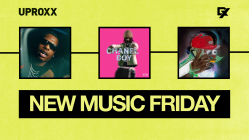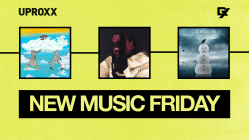El Mariel
definitely sounded promising. This historical event has rarely been touched on
and who better to discuss the significance, depth and richness of the story than
a Cuban rapper who has already established himself as a mainstream act to be
reckoned with? However, as we have seen in the past, what seems good doesn’t
always turn out that way.
The album kicks off with a nice introduction by a spoken-word
artist. “Miami Shit” and “Come See Me” follow it up with a powerful thump and
an exceptional flow. This can be found throughout the album. What lacks at
times lies in the content. “Ay Chico,”
“Be Quiet,” “Descarada,” “Jealouso,” “Voodoo” and “Bojangles” all serve the
exact same purpose, and none go beyond your average radio/club track. Granted,
thanks to the variety of producers, these beats will make a club dance floor
fill up, but none contain any real lyricism or rhyme schemes. Pit’s flow and the club banger
instrumentals make up for the lack of lyrical originality here but the amount
of tracks that sound like this may be too much monotony for some to avoid.
Pit later shows
he is capable of lyrical dexterity with “Blood is Thicker Than Water” and “Raindrops.”
He demonstrates this by showing a higher level of thinking that extends beyond
the average Tony Montana dream: “There’s no looking or turning back/I used to
watch coke turn to crack/But that’s what made me turn to rap.“
Pit goes on to
discus the agony of poverty, betrayal and the government’s role in his life.
Later, he shows the impact his father’s death has had on him on “Raindrops.”
The track is given a great musical boost by the show-stealing voice of Anjuli Stars. It’s important to
note that this album isn’t for everybody. He has many tracks in Spanish/English
(“Que Tu Sabes D’Esto,” “Ay Chico,” “Voodoo”) and one that is completely in
Spanish (“Dime Remix”). The language barrier wasn’t a problem for me, but it
likely offers nothing for any listeners unfamiliar with Spanish.
The main gripe is in his topic selection. Why name an album
after such an important time in Cuban-American life if you aren’t going to rap
about it? Instead, we get a variety of cookie-cutter club tracks, loud choruses
about dancing and not enough substance to balance this out. Worse yet, the
spoken word artists in the interludes “murder” him on his own shit (word to Nas). They touch on the Mariel
Boatlift, Hurricane Katrina, George Bush
and how we are all united in a fight for freedom. It would’ve been nice for the
actual artist on the album to do some real talk himself.









